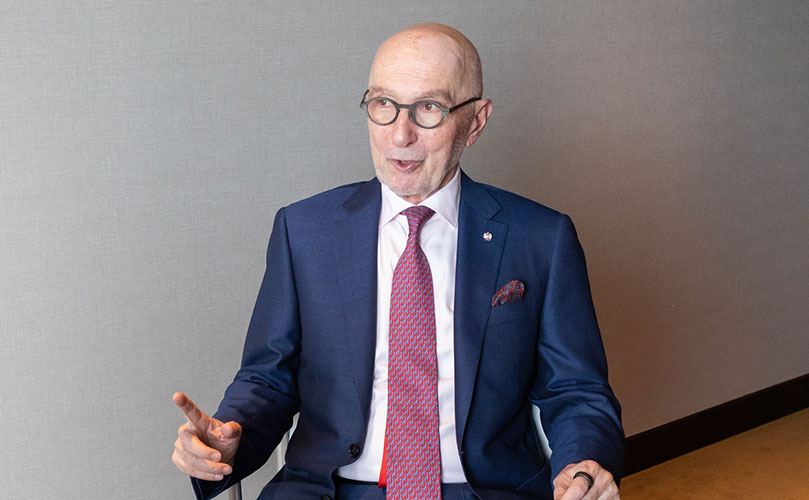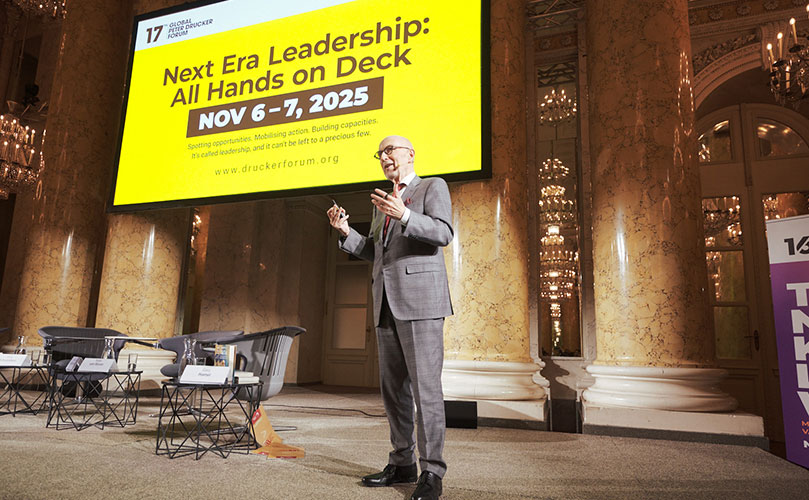Insights from the Founder of the Global Peter Drucker Forum Thriving in the age of AI

Article | 2025-09-24
7 minute read
To cope with the reality of rapid change, today’s leaders need to question the fundamentals of existing management beliefs. That is the message from the Global Peter Drucker Forum, which is actively making transformational proposals from Vienna based on the thinking of the father of management, Peter F. Drucker.
This is an initiative called “the Next Management,” proposed by the Forum in 2023, which has garnered significant attention globally.
Fujitsu interviewed Dr. Richard Straub, the Founder and President of the Drucker Forum, during his recent visit to Japan. Dr. Straub shared his views on the limitations of conventional management practices and his vision for the leaders of tomorrow.
Affiliation and position are as of the time of the interview.
Organizations are like intertwined trees; Leaders should act like gardeners
“Peter Drucker always said that thinking about management as being just about business reduces its true scope,” said Dr. Richard Straub.
“Institutions today are more like trees, connected under the surface. Society is like a big garden where a variety of trees grow. So, managers need to act like a gardener.”
In an interview with Fujitsu in Tokyo, Dr. Richard Straub likened the today’s ideal leader to a "gardener." He stated that it is crucial to cultivate not just a single tree (representing an individual organization) but the entire garden (representing the ecosystem) with a long-term perspective.
In 2009, Dr. Straub launched the Global Peter Drucker Forum to commemorate the achievements of Peter Drucker. Each year, the forum held in Vienna brings together thinkers, leaders, and innovators from around the world for open conversations on the future of management.
In recent years, many issues have been raised regarding how to respond to rapid changes and increasing uncertainty in business and society, such as geopolitical tensions, digital disruption, and of course, the rise of artificial intelligence.

However, the traditional top-down, hierarchical management approach is no longer adequate to solve the complex crises we currently face.
In response, the Drucker Forum launched the "Next Management" initiative in 2023, an open and collaborative project aimed at shaping a new management framework for the 21st century. The plan is to mature this initiative over five years, leading up to the Drucker Forum's 20th anniversary in 2028, through intensive discussions and research involving academics and business leaders worldwide.
“The way how we thought about things and did things yesterday may not work today” he says,“because the world has changed and is changing even as we speak. Over the past 200 years, there have been numerous transformations in society, such as the Industrial Revolution including the invention of the steam engine, and the IT revolution. It is still too early to accurately assess the changes that AI will bring about, but I believe that it has the potential to be on par with the revolutions of the past that fundamentally changed the world.”
Dr. Straub says one of the management problems looming over large organizations today is their strong tendency toward bureaucracy.
“It's a pure nightmare for a small company to deal with a large company, when it comes to the process of getting an invoice paid right,” he says.
“What can people really decide? How much autonomy is given to them? Who is closest to the customer? These are the other side of globalization when organizations have become too big and have too many layers of management. IT systems, which were supposed to reduce the bureaucracy, often ended up making them more complicated.”
In 2023, the Drucker Forum announced seven guiding principles as a first step in proceeding with the initiative:
1. Innovation, more than efficiency
2. Ecosystems, more than single institutions
3. Long-term, more than short-term focus
4. Human augmentation, more than automation
5. Management as an art, more than a science
6. Reality grounded, more than ideology
7. Self-renewal capacity of institutions – not revolution
“These principles are not ready-made prescriptions which we recommend organizations should follow,” explains Dr. Straub.
Peter Drucker believed that the important job is never to find the right answer but to find the right question. These principles are meant to highlight the domains of important questions to ask. These are designed to help business leaders to deeply think about their management transformation over several years, in response to their respective management environments and challenges.
Management transformation is needed for Japanese manufacturers
Peter Drucker was delighted that his books became bestsellers in Japan, and during his lifetime, he frequently visited Japan, building strong relationships with business leaders like Sony’s Akio Morita and OMRON’s Kazuma Tateishi.
Dr. Straub also spent time engaging with many Japanese business leaders during his visit. Particularly, he saw common challenges between Japanese and German manufacturers.
“Many of these manufacturing companies have a long history of 80, 90, or even 100 years. The industry is fundamental to society and what they have developed really makes up the infrastructure of our society. Japan should be proud of having such a strong industry,” says Dr. Straub.
But he also sees a challenge. Long-established manufacturers with physical production assets often find it harder to act with agility, especially in a digital world. He then emphasized the necessity of management transformation, along with significant opportunities for growth.
“You cannot change whole plants overnight like you do in the software space. You need to make long-term investments for ten years or fifteen years. This is where management comes in. CEOs must examine their existing ways of business, even if these are performing well, and explore management innovations for the future.”
Rethinking knowledge work in the age of AI
Even in the face of rapid change, Dr. Straub says that managers should keep in mind that there is one thing which never changes.
That, Dr. Straub says, is human nature.
“As anthropologists and philosophers have said for millennia, human nature — like hate, love and desire — is one thing that doesn't change.”
He says one of Drucker’s key themes was how to cope with workers who become psychologically destabilized when facing changes in their work environment.
“It is totally natural for people to want stability. No one wants to lose their job to AI.”
So how should managers respond? Dr. Straub says we can find a clue in Drucker’s thinking.
Peter Drucker said that the task of management is to make people capable of joint performance, to make their strengths effective and their weaknesses irrelevant. And he believed that the greatest challenge for management in the 21st century is improving the productivity of knowledge workers.
According to Dr. Straub, knowledge work consists of two types: ‘Routine Knowledge Work’ and ‘Creative Knowledge Work’.
“Unfortunately, Routine Knowledge Work, which involves gathering information and analyzing data, can be delegated to AI and is going away,” says Dr. Straub. “Managers must be nice to employees and care for them, but it is more important to help them understand how a different future may come and how they can adapt.”
Dr. Straub stated that ‘Creative Knowledge Work’ is becoming even more important today and should almost certainly constitute a greater share of human knowledge work within each organization.
Furthermore, he emphasized the necessity for organizations to grow not just as individual entities, but through their interrelationship with society.
“In the old world, you were able to control your organization. But now, you’re a part of broader ecosystem, which you cannot control. A manager’s role as a gardener of ecosystems is to ensure it works as a whole and your organization is well fit in it.”
He again stressed the need to take a longer-term perspective focused on generating value for customers and society.
Towards the next era of leadership
The theme for the 2025 Drucker Forum, for its second year of the initiative is “Next Era Leadership: All Hands on Deck.” Its next annual conference is scheduled in November.
Dr. Straub explains his intention behind the theme saying that during times of drastic change, every member of society should play a role and work together as one.
“The Next Management is a process of sharing experiences and thinkings and learning from each other. We need to question ourselves about existing management beliefs. We want more organizations to join the initiative, so that we can create a strong momentum to transform our society.”

Fujitsu has been partnering with the Global Peter Drucker Forum since 2018. We’ve long believed in Peter Drucker’s core thinking that organizations exist not just to make profits but to contribute to society. Now, we are committed to the Next Management initiative.
In June 2025, we marked our 90th anniversary, with the message: “Every breakthrough begins with a question.” To progress the Next Management initiative, it is necessary for each manager to ask fundamental questions about management transformation. Fujitsu remains committed to shaping a more sustainable society, together with our partners.
Supervised by: Yoshikuni Takashige, Senior Advisor of Ridgelinez Limited and Ambassador of the Global Peter Drucker Forum
Richard Straub
Founder and President
Global Peter Drucker Forum
Dr. Richard Straub has drawn on his ample experience in leadership and management in his career at IBM. Over the past decade, he and his wife Ilse have built up the Global Peter Drucker Forum. Today, the Forum is recognized globally as a leading management conference. In 2019 Dr. Straub received the Grand Decoration of Honor from Austria in recognition of the impact of the Drucker Forum.

Related Information
Advancing Net Positive - Driving Profit with Purpose

A Future Strategy Powered by AI and Net Positive Thinking

